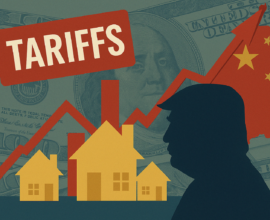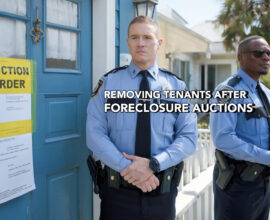Which Real Estate Niches Performed Well During the Last Recession?
There’s an old saying that claims “those who do not learn history are doomed to repeat it.” While many use this adage as a warning to learn from our mistakes lest we make those mistakes again, it also means we can look to the past to gain insight into the future. You may not have thought that real estate investing involved paying attention to history, but taking note of the past will only help improve your investment future.
Many investors are looking at the present and worrying about a potential upcoming recession. With the current state of things (global inflation, supply-line delays, political unrest, and the continued global pandemic), a recession is a very real possibility.
Instead of pretending that you can guess the future, now is the time to ask, “what kind of real estate niches performed well during the last recession?”
What Exactly Is a Recession?
Recessions aren’t some abnormal economic crisis, even if they feel that way. Recessions are part of a regular and healthy economy. Of course, major recessions can cause a number of negative impacts.
Recessions can occur for several reasons. It might be easy to blame current events, which can certainly affect a recession’s onset; most of these economic events have been in the making for a long time. In 2019, just months before the first case of COVID-19 wreaked havoc on the world, the U.S. was enjoying a massive economic expansion.
In fact, the 120 months of growth tied for the longest expansion period in U.S. history. Unfortunately, what goes up in an economy will eventually come down.
Some of the most common causes of expansion include:
- Economic overheating: Rising inflation and unemployment numbers below the natural rate
- Asset bubbles: The rapid growth and subsequent bursting of asset bubbles, like the 2001 “dot.com” stock bubble and 2007-09 housing bubble
- Economic shocks: Unexpected external events that shock the economy, like the oil shocks of the 1980s
If any of these situations sound familiar, then you’ve been paying attention to recent news. That’s why many economists and investors are trying to prepare for a recession.
What About a Housing Recession?
A full economic recession and a housing recession are similar events but impact different parts of the economy. Housing recessions typically come from something called “speculations.” Speculation is a term that refers to when investors buy houses in hopes of turning a major profit in the future. They are “speculating” that the home values will go up.
Flipping houses has been a powerful tool for investors for ages and can’t bring on a housing recession by itself. However, sometimes more and more speculators get involved and buy most of the available housing. This creates a high demand from both investors joining the party and regular home shoppers looking for a place to live. This high demand and limited inventory lead to soaring prices.
The result of a recession has the potential to impact investors in a number of ways. The Great Recession provides a glimpse of what to expect.
Depreciated Real Estate Prices
As demand for housing increases and inventory doesn’t increase at the same rate, prices will rise. Prices can reach a point where no one can afford them. For home sellers to unload their houses, the prices have to come down.
This might seem like a major positive for those looking to purchase a home, but there can still be a disparity between home values and income, which can prolong or worsen the recession.
Increased Demand for Rentals
Recessions make people nervous. No one wants to purchase a home only to have its value drop significantly overnight. They also don’t want to risk having a higher mortgage during a period of potential income flux. This uncertainty pushes people towards rental properties until the market settles.
Landlords can often use the higher demand for rental properties to raise rents and take their pick of quality tenants. In some parts of the country, large cities have laws that regulate how rent increases work.
In San Francisco, the max a landlord can raise the rent is controlled by the S.F. Rent Board. In 2020, the rate was set at 1.8%. In Florida, there are currently no laws that regulate rental prices or increases. There was, however, a bill introduced in the Florida senate to implement some kind of rent control, although it’s nowhere near in effect or even expected to pass into law.
Real Estate Is Still a Great Investment During a Recession
It would be easy to look at the economic trends and become a little apprehensive about your investment properties and growth potential. It’s critical to remember that real estate is one of the most stable investments.
Housing will always be a basic need. While interest rates will rise and fall, people’s buying power will change, and prices will fluctuate, people still need a place to live. You can hold off on updating to the newest iPhone, but it’s much harder to go without housing.
Just because part of the economy is heading for trouble doesn’t mean everyone is going to suffer. For example, when the dot-com bubble burst, the stock market was turned all over on itself, but real estate investors didn’t suffer. Most small-scale real estate investments are affected as stocks become more volatile.
Which Niches Are Historically Reliable During a Recession?
While real estate as a whole won’t tank during a recession, there are some niches that historically perform better during those hard times. Two of the most recession-proof investments in real estate are self-storage units and mobile home parks.
Mobile Homes
Mobile homes and mobile home parks may not be the most glamorous investments, but they have some unique selling points that help them survive a recession. For starters, these homes are steady in all economic cycles. When housing prices hit unreachable levels, mobile homes offer affordable options.
Since mobile home parks don’t come off as sexy as other investments, there’s often much less competition. You’ll also deal with lower maintenance and capital expenses overall.
According to Green Street Advisors, a real estate research firm, operating income from mobile home parks rose by 87% between 2004 and 2018. The other significant benefit is that mobile home owners tend to stay put. Unlike tenants of a traditional rental property who may move every few years, mobile home park residents tend to stay put (90% retention rate). That means you don’t have to deal with turning over properties, advertising for new renters, etc.
During the last recession, mobile home parks proved their recession-proof abilities. According to Douglas Danny, a Marcus & Millichap broker with expertise in manufactured housing, mobile homes are one of the safest assets during a recession. He said, “from 2008 to 2012, there was no effect whatsoever on manufactured housing.”
Self-Storage Units
If you’ve ever wondered why cities like Tampa and Ft. Lauderdale seem to have self-storage units pop up everywhere, it’s because they are great investments. Regardless of whether the economy is growing or in a recession, these units tend to do wonderfully. These facilities are adaptable and can be extremely easy to manage. Over the past two decades, the net operating income for self-storage units has outgrown and out-performed many other investment niches.
During the 2008 recession, self-storage units were able to deliver a consistent 5.1% return. During that same time, real estate investment trusts (REIT) showed nearly a 38% loss. It’s also not uncommon for rental rates to increase by as much as 6% without deterring tenants.
Of course, residential housing is always a solid investment as people need a place to live. COVID-19 has taught many companies that they don’t necessarily need an office or storefront to conduct business. If the economy takes a dive into a recession, commercial real estate is often the first to see dips. Residential housing won’t disappear, even if the way it looks and operates takes on a different look.
What to Keep in Mind During These Times
Just like any other investment, real estate is often considered a long-term game. While there are certain niches of house flippers who count on quick turnarounds to earn a profit, home values tend to increase over time more often than they plunge.
Surviving a potential recession may not require more than keeping at what you’re already doing, even if things slow down for a little while. You might find it necessary to be a little more cautious with your cash flow or expectations, but the need for housing isn’t going anywhere, and supply is still shadowed by demand.
If you’re looking to build your portfolio during a recession, there are plenty of opportunities, depending on your capital. Whether you decide to jump in on a mobile home park, self-storage unit, or stick with real estate, there’s still potential for growth, even during hard times.
Of course, there’s no guarantee that a recession is coming just yet or that one that comes will have devastating impacts. History shows us that real estate, while not completely bulletproof during a recession, is still one of the best places to put your money.








